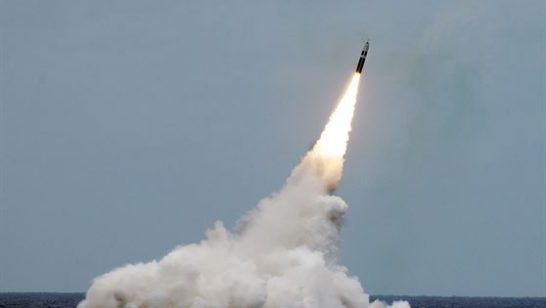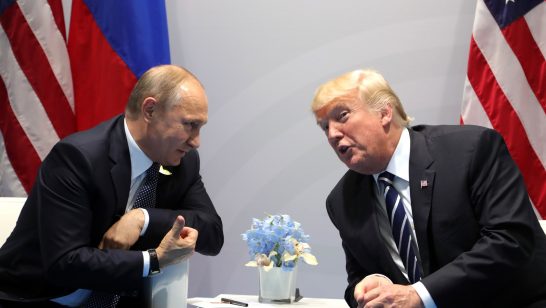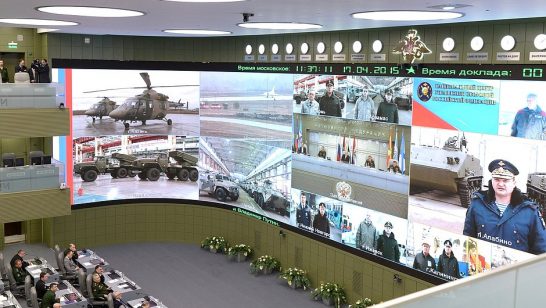
Vladimir Putin’s presidential address to the Federal Assembly on 1 March – revealing that Russia is developing new intercontinental and low-flying stealth missiles and other technologies, in what appears to be an escalation of an arms race with the West – dominated the headlines only a couple of weeks before the 18 March presidential election. This followed the publication of the US Nuclear Posture Review which, according to one expert, ‘lowers the threshold for nuclear weapons use’. The fact that Russia prioritises its strategic nuclear forces is hardly news. But two key questions arise from Putin’s address.
First is how this will impact upon arms control. The ramifications of NATO’s BMD deployment, the possible demise of the INF Treaty and concerns that the New START Treaty may not be extended beyond its expiry date of 2021 demand urgent action by both Russia and the US to address a dangerous institutional vacuum. It was encouraging that bilateral arms control talks resumed in September 2017. However, in the current climate of deep mistrust in both countries’ defence and security establishments, there are hurdles to overcome if sufficient political will is to be invested into tackling the many problems threatening strategic stability, and indeed relations more generally. As the fourth Putin administration starts work, the likelihood is that the focus will be on reducing tensions and making incremental gains, but a new ‘reset’ based on common understandings of the ‘rules of the game’ appears a much more remote prospect.
The second question revolves around Moscow’s spending priorities. The greater part of Putin’s address focused on the economy and openly spoke of the pressures on the Russian budget of sustaining growth and welfare provision. Whether Russia could sustain an arms race is open to doubt. IMF forecasts indicate that the Russian economy is ‘turning the corner’ as it adjusts to lower oil prices and the effect of sanctions, with possible modest growth over the coming period. But – as Putin openly acknowledged – structural problems remain: growth levels will be difficult to sustain without increasing productivity, investment is lagging and is exacerbated by rouble depreciation, further structural reforms are needed in the legal system and property rights, and efficiency gaps in public investment and tax collection need to be plugged. Moreover, the signs are that regional integration within the Eurasian Economic Union is flagging. Putin’s address laid emphasis on ‘traditions and values’ as ensuring continuity and stability, but also pointed to the larger issues of economic modernisation, and political and social reforms to underpin it, as just as urgent a task.
Both of these questions would seem to suggest that renewed engagement with the West should be explored. But there are few signs of a resolution of the ongoing civil war in Ukraine, which is compounded by a battle of historical narratives between Moscow and Kyiv that threaten to perpetuate the conflict and vitiate attempts to start meaningful negotiations. Authoritative Russian commentators speak of a systemic crisis in Europe deriving from a clash of interests in the contested neighbourhood, with mutual containment overshadowing any common European perspective. Europe’s leaders share Kyiv’s mistrust of Moscow and see few positive signs from the Kremlin of a change of mind that might initiate progress in resolving the Ukraine conflict. Other pressing issues – trade relations with the US and China, turbulence on its southern periphery spilling over into Europe, anti-establishment populism and Brexit – appear to be deflecting attention from more active EU involvement in breaking the deadlock in Ukraine, though the French, German and Italian leaderships do appear ready to push forward a dialogue with Moscow that both NATO and the EU insist is desirable. Commentators suggest that there may be little movement until after the 2019 Ukrainian parliamentary and presidential elections. But of concern to Moscow should be the lack of support for Russian actions among its other neighbours, Belarus included. Moscow’s security logic maintains that the benefits of keeping its neighbours in Russia’s ‘sphere of privileged interests’ outweigh the costs. Whether a fourth Putin administration will shift its dominant narrative, of a hostile Euro-Atlantic bloc that must be countered by relying on Russia’s own material and moral resources, towards renewed engagement remains to be seen. Both Russia and Europe insist that there can be no return to ‘business as usual’ but there is a paucity of ideas in terms of a strategic framework for common approaches to wider Europe.
Further afield, any valid arguments Moscow may have over the Syria conflict, and the constructive part it has played in issues such as the Iranian nuclear programme, are overshadowed in the eyes of the West by its support for the Assad regime and consequently it shared responsibility for the humanitarian disaster, notably in eastern Ghouta. Moscow’s calls for a political settlement, after seven years of brutal civil war, come up against the same problem of Assad’s future. Limited agreements, such as the ceasefire agreed last summer between Russia, the US and Jordan, have not proved decisive. Of longer-term importance are the shifts in regional alliances, which neither Russia nor the Western powers can control, and how Russia and the Western liberal democracies – differing in their perceptions of the international system – can cooperate in restoring a measure of stability in the Middle East and North Africa. Assessing the political balance sheet – what exactly Russia has gained from involvement in the region – will be another issue for Putin’s fourth administration.
Moscow complains that the West fails to understand its security interests, but Russia’s political leaders are equally guilty of refusing to understand Western motivations and priorities (and may be overestimating the crisis in Western liberal democracy). The more gratuitous aspects of Moscow’s ‘information campaign’, shading into ‘strategic deception’ and even interference in the domestic affairs of states in order to undermine confidence and cohesion, may seem to Russia’s securocrats a fitting response to Western intervention in Russia’s affairs but is in danger of becoming a toxic ‘brand’, undermining any genuine interdependence. Foreign minister Lavrov has said that the function of foreign policy is to create a favourable environment in which a country can flourish domestically. The question again arises: what does this bring Russia in terms of material and reputational gains?
Some in political circles are aware that Russia cannot shape global affairs, and that its regional influence will be constrained, without some kind of partnership with the West – Moscow’s calls to that effect are not purely rhetorical – but its foreign policy strategy has focused on tactical gains. The fundamental issue of who determines Russia’s national interests in a situation of competing interest groups and whether the incoming administration contains figures of sufficient authority and ability – one of whom may be ready to take over six years from now – to engineer a positive, if gradual, shift in its external relations are open to conjecture.
The opinions articulated above represent the views of the author(s), and do not necessarily reflect the position of the European Leadership Network or any of its members. The ELN’s aim is to encourage debates that will help develop Europe’s capacity to address pressing foreign, defence, and security challenges.



